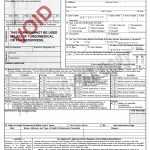If you have ever applied for an FAA medical certificate, you know the first step is to complete your application online at MedExpress. Next, you schedule and submit to a physical examination with an FAA aviation medical examiner (“AME”). At that point though, the process isn’t necessarily the same for all applicants. For about 96% of the applicants (in 2018), the AME issued the applicant a medical certificate. The other 4% of applicants in 2018 had their applications deferred by the AME to the FAA’s Office of Aerospace Medicine in Oklahoma City.
So, what happens to airmen medical applications once the examination is completed and the AME has either issued or deferred?
The AME sends the applications to the FAA’s Aerospace Medical Certification Division (“AMCD”) in Oklahoma City for review/processing.  And if the certificate was deferred, it is at that point that the airman may feel like his or her application has disappeared into a bureaucratic abyss.
And if the certificate was deferred, it is at that point that the airman may feel like his or her application has disappeared into a bureaucratic abyss.
At AMCD the FAA’s Document Imaging Workflow System (“DIWS”) processes airmen medical applications it receives and then it prioritizes those applications for review. Applications where the AME denied the certificate, deferred the application or issued a special issuance certificate are considered priority applications, as are the first and second class medical certificate applications for airmen who will presumably be using the certificate to earn a living.
Applications where the AME issued the certificate are non-priority applications. Not surprisingly, the FAA processes priority applications before non-priority applications. But it is important to keep in mind that when the FAA receives the applications, whether deferred or issued, it has the authority to change an AME’s decision to defer or issue a medical certificate.
If a certificate was issued, the application is reviewed by DIWS to confirm that no errors were made in issuing the certificate. DIWS uses a long list of “critical reject codes” based upon the questions in Section 18v of the application and any disclosed medications to identify whether the certificate may have been improperly issued. If errors are detected, the application is referred to a “legal instrument examiner” (the “Examiner”).
When an application is deferred or when an error in the application for an issued certificate is detected, an Examiner is notified. If hard-copy medical records are submitted to the FAA in connection with an application, whether issued or deferred, the records are scanned and forwarded to an Examiner. The Examiner then reviews the application, supporting documentation/medical records, as well as any previous medical issues in the applicant’s medical to determine whether the case is decision ready.
How does the Examiner decide what happens with the application?
By following the regulations in 14 C.F.R. Part 67, referring to the FAA’s internal guidance, including the FAA’s Medical Certification Manual, and consulting with FAA physicians/consultants when necessary.
If the Examiner determines that the case is not decision ready, then the Examiner may send correspondence to the applicant requesting additional information. This could include a request for medical records, court or police records, or additional testing or evaluation. Alternatively, a review by the FAA’s physicians/consultants may be necessary in order to decide the case.
Unfortunately, both situations delay the FAA’s processing of the application. Requesting additional information takes time and may result in back and forth correspondence between the airman and AMCD, especially if the applicant does not provide a complete submission when he or she responds to the first request. Also, the FAA currently has a back-log of cases requiring physician/consultant review.
Once the case is to a point where the Examiner is authorized to decide what to do about the application, the Examiner will then send the applicant correspondence indicating the FAA’s decision. If the Examiner determines that no disqualifying conditions are present, the application where a certificate was issued is filed electronically in DIWS.
Where the application was deferred, the Examiner will issue a denial of the application if the Examiner has determined that the airman does not qualify for a certificate. If the Examiner has determined that the airman is qualified to hold a certificate, the Examiner will issue either an unrestricted or a special issuance medical certificate, as appropriate.
National Driver Register
Applicants should also be aware that the FAA checks the National Driver Register each time an airman’s application for medical certificate is sent to AMCD. If the search reveals a drug or alcohol related motor vehicle action, an FAA investigator will contact the state motor vehicle agency to request the applicant’s driving record. Depending upon the circumstances, an applicant’s failure to properly report an offense, either on the application or per 14 C.F.R. 61.15(e), could result in certificate action against the applicant’s airman or medical certificate.
Conclusion
The FAA’s processing of applications for medical certificates doesn’t stop when the AME’s examination is complete. For airmen who are issued certificates, most applicants, the subsequent processing may be invisible. For airmen whose applications are deferred to AMCD or whose applications are flagged by DIWS, the process can be difficult, frustrating, time-consuming and sometimes expensive.
In those cases where AMCD requests additional documentation it is important, to the extent that you are able, to give AMCD all the information it requests in connection with the application. Incomplete submissions will delay processing of the application.
Also, in many cases it may be more effective to engage your AME to communicate with AMCD directly to save you having to navigate the FAA’s phone-system trying to find a real person with whom you can discuss your case. And the right AME can sometimes help an airman cut through some of the red-tape. In the end, if you find yourself in a situation where your application has been deferred or flagged, more than an ounce of patience will be required.


